Ready to create more pipeline?
Get a demo and discover why thousands of SDR and Sales teams trust LeadIQ to help them build pipeline confidently.

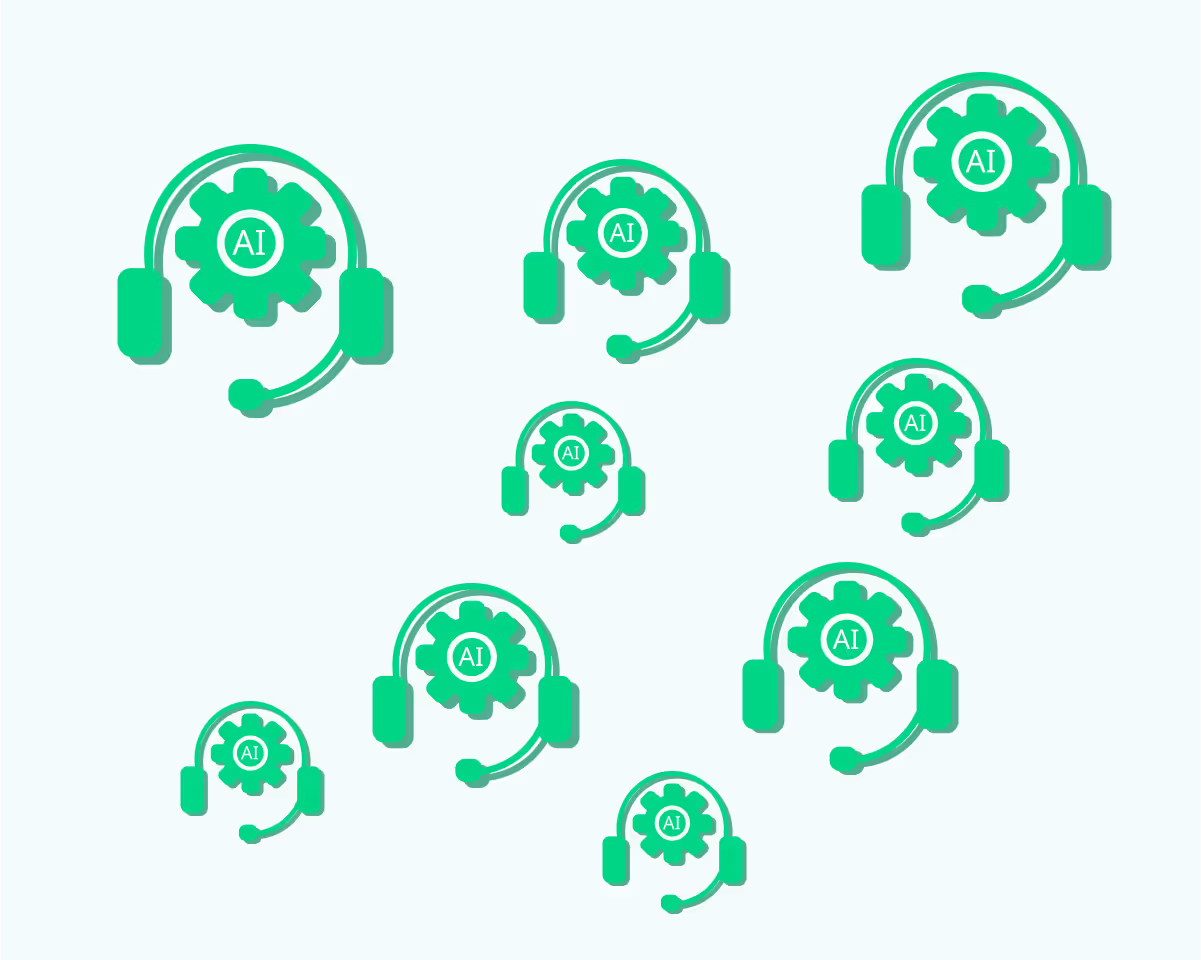

To augment sales performance and win more business, leading teams are implementing AI sales agents that work around the clock to automate various sales tasks.

High-quality AI sales agents are packed with features and functionality including scheduling meetings, responding to customer inquiries, and even training reps.

By taking a data-driven approach to sales and continuously learning, AI sales agents help teams get better and achieve better results over time.
Get a demo and discover why thousands of SDR and Sales teams trust LeadIQ to help them build pipeline confidently.
We all know how difficult it is to follow up quickly, keep our CRM updated, and research prospects to send personalized outreach.
But… What if someone — or something — could do this for you?
That’s where AI sales agents come into play.
This new technology can help teams achieve more with less by providing always-on, automated sales assistance tailored to your needs.
Keep reading to learn more about AI sales agents, some of the top tools on the market, and how best to implement this new-age technology.
AI sales agents are autonomous tools that can manage and streamline sales tasks entirely on their own.
Powered by artificial intelligence, AI sales agents can proactively initiate conversations, answer questions, and even manage lead qualification — all without human intervention.
Unlike their human counterparts, AI sales agents work 24/7. If a lead feels inspired enough to reach out to your company at 2 a.m., an agent can respond immediately — ensuring a warm lead stays that way. The technology is particularly helpful at improving response times and also helping teams manage high lead volumes (e.g., following a successful product launch).
Due to these benefits, it comes as no surprise that 88% of organizations are either already using AI agents or are already piloting them, according to KPMG. While AI agents are expected to bring in $7.38 billion this year, the market is projected to explode to $47.01 billion by 2030.
AI sales agents are capable of handling all sorts of sales tasks:
Now that you’ve got a better idea of what AI sales agents are capable of, let’s examine some of the more powerful options on the market today.
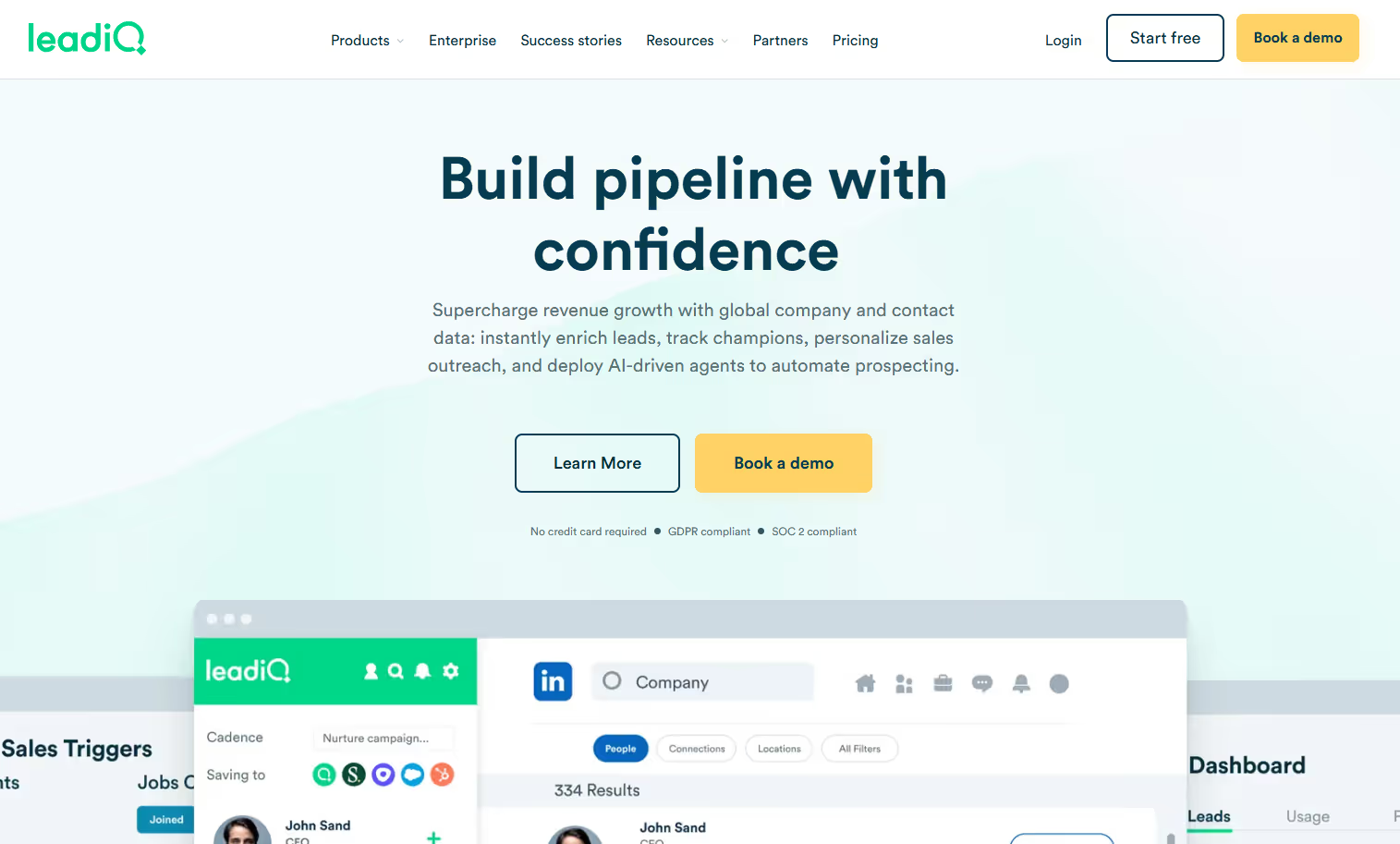
G2 score: 4.2 out of 5 stars (1,095 reviews)
LeadIQ is an AI-powered prospecting platform that helps sales teams find, capture, and enrich lead contact directly from places like LinkedIn and company websites.
LeadIQ key features:
LeadIQ pros:
LeadIQ cons:

G2 score: N/A
11x is an AI-powered sales platform that offers two digital workers: Alice, which automates SDR workflows by identifying prospects aligned with your ideal customer profile and engaging relevant prospects, and Julian, which operates as an inbound sales rep, responding instantly to leads, scoring them, and routing them to the right person.
11x key features:
11x pros:
11x cons:
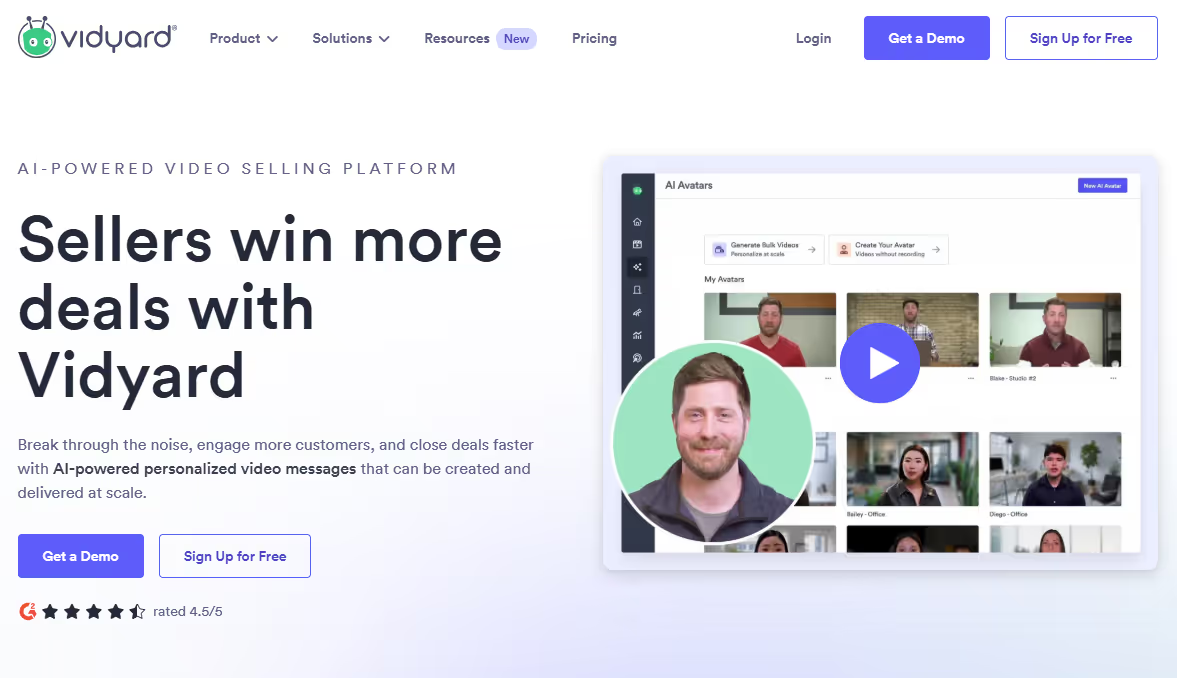
G2 score: 4.5 out of 5 stars (808 reviews)
Vidyard is a video messaging service that leverages AI to help reps create, personalize, and optimize video messages for better engagement and more conversions.
Vidyard key features:
Vidyard pros:
Vidyard cons:
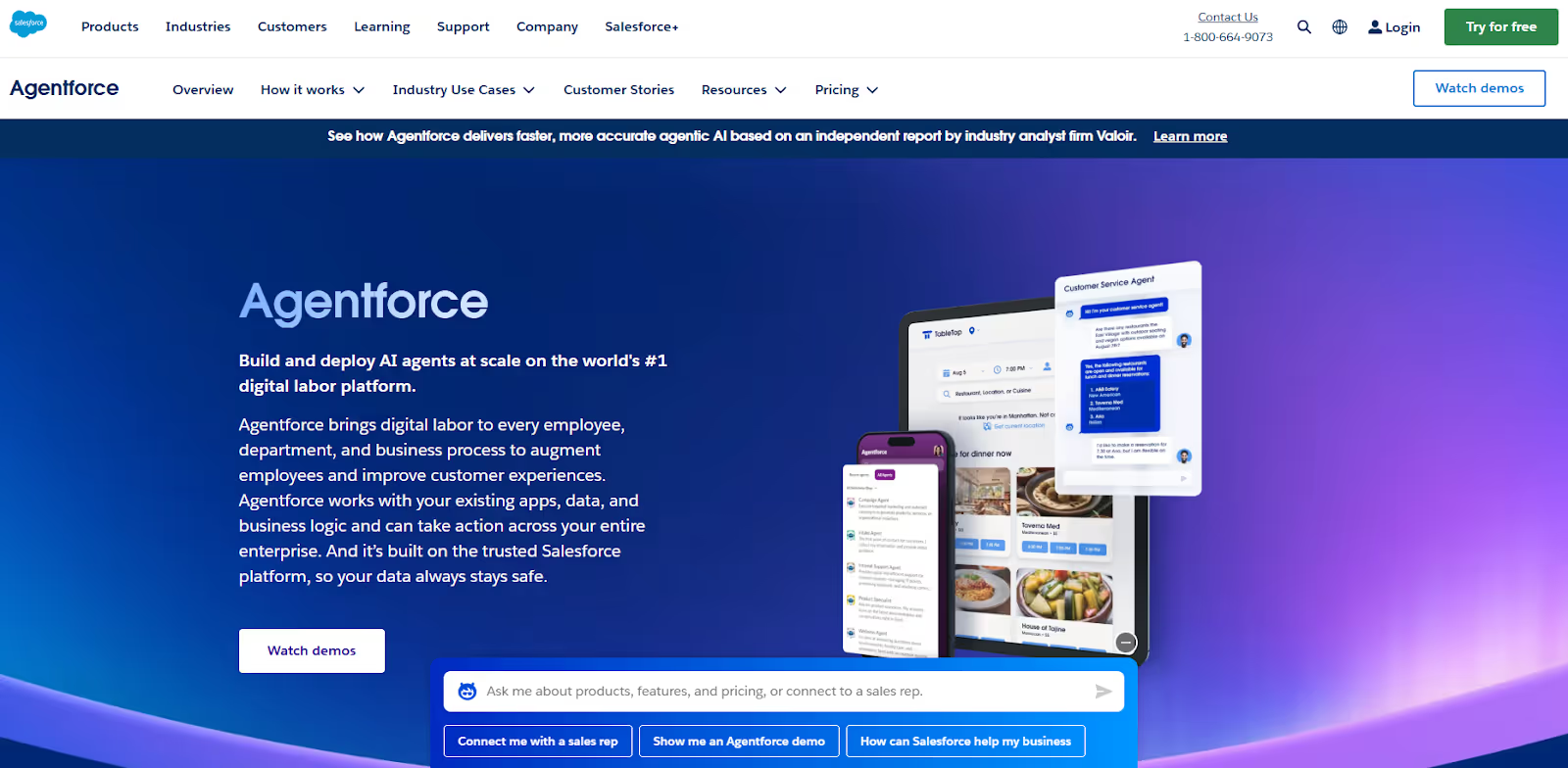
G2 score: 4.4 out of 5 stars (121 reviews)
Agentforce is a platform designed for building custom AI agents that autonomously handle sales tasks and conversations by responding to customer inquiries, providing pricing information, helping with billing and payment, processing renewals, offering troubleshooting support, and more.
Agentforce key features:
Agentforce pros:
Agentforce cons:
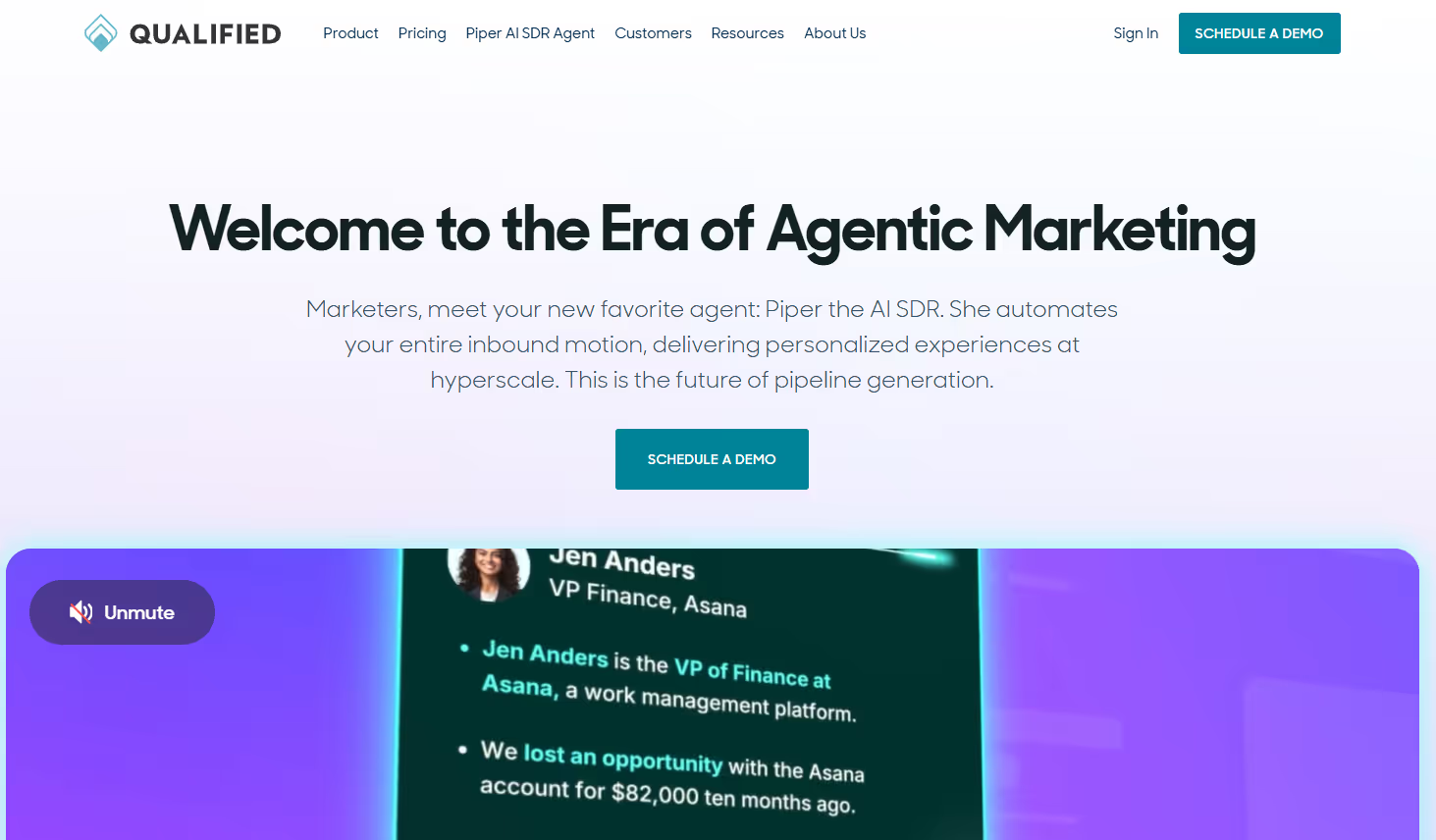
G2 score: 4.9 out of 5 stars (1,205)
Qualified is an agentic AI-driven conversational sales platform that identifies, qualifies, and converts website visitors in real time using chatbots and live engagement tools.
Qualified key features:
Qualified pros:
Qualified cons:
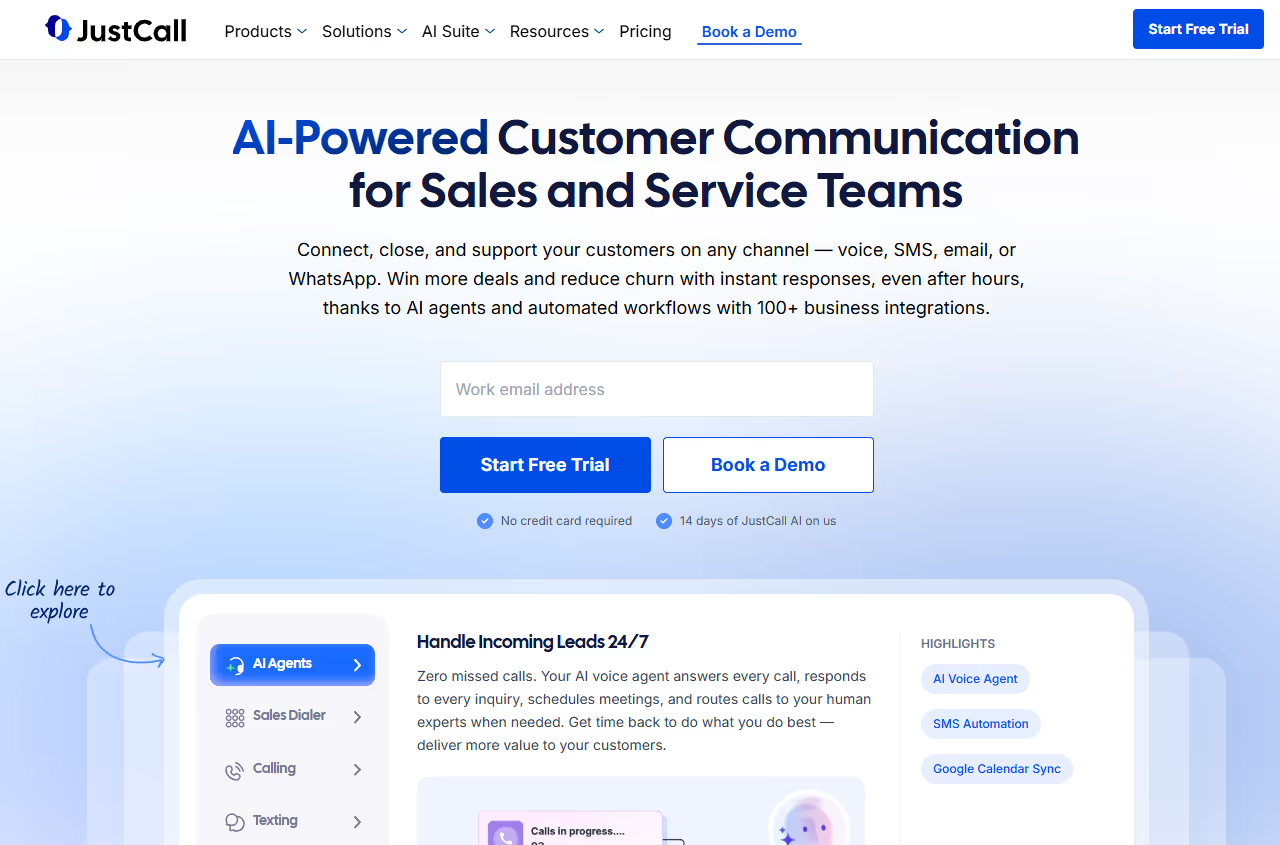
G2 score: 4.3 out of 5 stars (2,193 reviews)
JustCall is a cloud-based phone, SMS, and email system with built-in AI capabilities that help businesses sell more effectively by automating outreach and using conversation intelligence to suggest the best path forward.
JustCall key features:
JustCall pros:
JustCall cons:
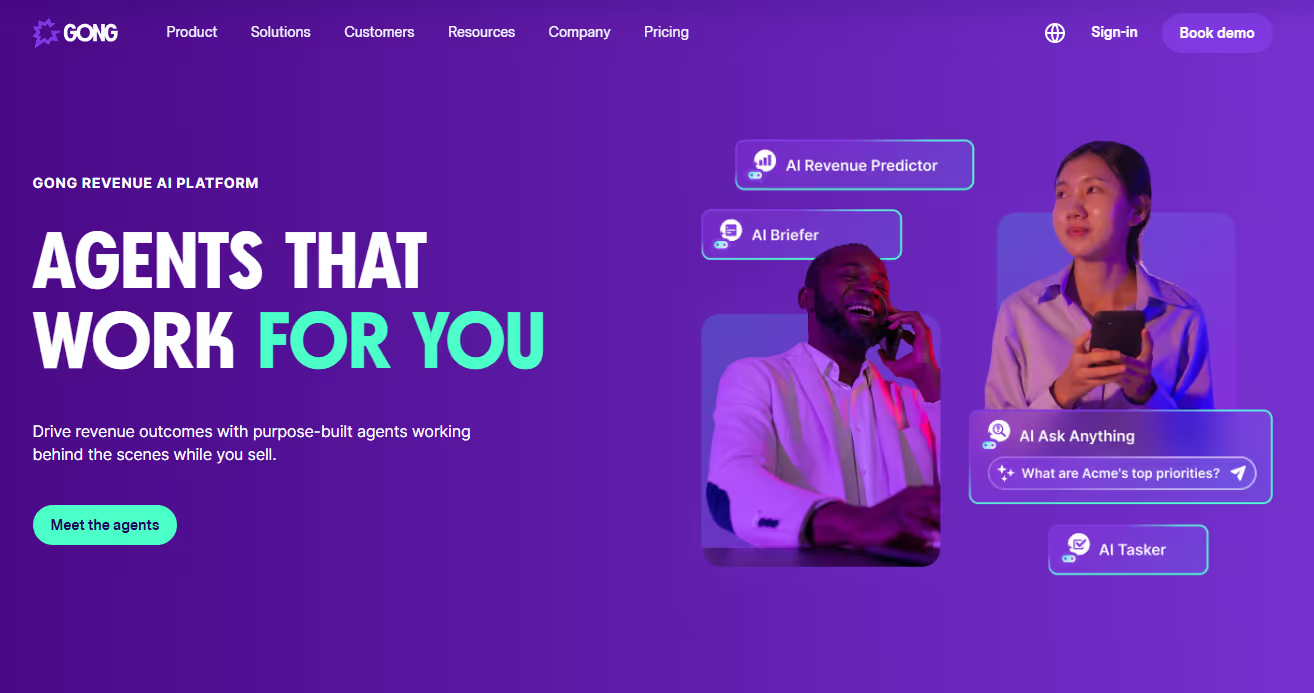
G2 score: 4.8 out of 5 stars (6,196 reviews)
Gong is an AI-powered revenue intelligence platform that analyzes sales phone calls, emails, and meetings to discover actionable customer-specific insights that help reps improve performance and close more deals.
Gong key features:
Gong pros:
Gong cons:
Gong use cases:
Just because you can adopt AI agents doesn’t mean you absolutely should. There are certainly some challenges to consider, like training biases and AI hallucinations, which have reared their ugly head in the real world (like when Air Canada had to honor a bereavement policy made up by a chatbot or when a GM chatbot sold an SUV for $1).
Before deploying an AI agent, it’s important to know how to evaluate and test the tools to get a better understanding of how they can help your organization get to the next level.
With so many different AI sales agent vendors on the market today — and so many different ways to put the technology to use — you need to have a precise understanding of the problem you’re trying to solve. Are you trying to generate more leads? Accelerate sales cycles? Reduce manual tasks? There’s no right or wrong answer here. You just need to understand what you’re trying to accomplish.
Not sure what that is? Start by identifying the gaps that exist in your processes and your team’s bandwidth, determining where you can complement your team best. While you’re at it, figure out where AI fits best in your funnel. Do you need top-of-funnel support (i.e., prospecting)? Or are you most interested in post-sale engagement?
Once you’ve answered all these questions, define your success metrics upfront. Perhaps you’ll measure impact by tracking key performance indicators (KPIs) like reply rates, meetings booked rates, and time-to-first-touch.
Now that you understand your goals for AI sales agents, it’s time to examine your existing tech stack — your CRM, marketing automation systems, and sales engagement tools — to see whether they offer any AI sales features you haven’t explored. In case you’re unaware, many platforms, like HubSpot and Salesforce, have built-in AI capabilities.
As you begin exploring AI sales agents, look for tools that seamlessly integrate with the rest of your tech stack. Whatever you do, don’t invest in something that will lead to more context switching and tool overload, which could discourage sales reps from trying the new tech in the first place.
Next, narrow down tools that align with your goals and play nicely with your tech stack.
At this point, assess each tool’s customization options. Can you adjust scripts, tones, and personas however you see fit? Assuming you have some sort of budget, you’ll also want to dig into pricing models to try and figure out how much each option might set you back. While some providers offer flat-rate subscriptions, others charge by usage (e.g., number of messages sent). The last thing you want is to be shocked when your initial bill comes in.
In a world that’s increasingly regulated and privacy-conscious, it’s important to look for tools that comply with relevant regulations — like GDPR, CPRA, and HIPAA, whatever’s pertinent to your operations.
As you continue researching your options, ask each vendor how they store lead and customer data, whether they delete data upon request, and whether individuals can opt out of sharing training data.
By now, you’ve found solutions that fit into your budget. But you have to remember that the costs you’ll incur with any new piece of technology are greater than just the monthly subscription fees.
Factor in onboarding, setup, training, and whether there are potential fees for integrations or premium features. If the vendor offers usage-based pricing, make sure you wrap your head around what those fees are; some tools charge per lead or interaction, so costs can quickly add up if you’re not paying attention.
Beyond this, you’ll also need to account for internal resources. How much time will your team spend managing, customizing, and maintaining the AI agent? There are also opportunity costs to consider; weigh the value of automating repetitive tasks against what reps could be doing instead — like nurturing key accounts or closing deals.
How do you determine whether your investments paid off?
Start with a clear hypothesis and define what success looks like. Once your hypothesis is nailed down, it’s time to roll out the tool to a small team or try a specific use case before jumping headfirst into the deep end.
As you begin testing the tech, set measurable KPIs and track key metrics like response time, conversion rates, and pipeline velocity. Keep your eyes on how the AI performs over time by regularly reviewing its work. How does it handle real-world interactions, errors, and edge cases? You don’t want to set AI on autopilot only to find out the hard way that it loves to hallucinate. During this process, talk to reps and prospects alike about their experiences to understand the strengths and limitations of the tech.
Since you’re unlikely to achieve AI mastery out of the gate, be ready to iterate as new sales data comes in to refine the AI and continuously optimize workflows.
Here at LeadIQ, we’re all about helping sales teams like yours unleash their full potential. Our powerful prospecting platform can supercharge your reps’ efforts — the same way it empowers our own team to achieve better sales outcomes every day.
In addition to tools that help you capture contact data and track champions as they move from one company to the next, our platform also delivers Scribe, a generative AI-powered email writing tool that enables you to write personalized emails in just a few clicks.
And we’re nowhere near done yet. Our roadmap is full of new AI-driven features that all aim to help sales teams cover more ground and win more business.
Ready to see what the fuss is all about? Request a LeadIQ demo today.